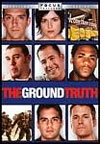
This is an article by Dana Stevens published online at Slate.com. It is a review of "The Ground Truth," a movie by Patricia Foulkrod.
PERMISSION TO SPEAK FREELY: The Ground Truth is a vital debriefing about Iraq.
With the record-setting exception of Michael Moore's Fahrenheit 9/11 (2004), documentaries about the Iraq war have performed dismally at the box office. Confronting the chaos and violence in Iraq, or the anguish of maimed young men and women returning stateside, is nobody's idea of a fun date at the multiplex. But viewer apathy can't be the only factor in the failure of Iraq documentaries to capture an audience. However hard-hitting and intelligent, many documentaries about the war still tend to feel like glorified versions of news segments you might catch flipping channels at home. An activist talking head critiques the administration's reasons for going to war. A Pentagon talking head presents the opposing view. Stock shots of jarheads in dusty vehicles and weeping wives at military funerals follow, leaving the viewer feeling, at best, sorrowful but vaguely edified: War is hell, and there's not a hell of a lot you can do about it.
The Ground Truth (Focus Features), Patricia Foulkrod's wrenching new documentary about returning veterans, may not single-handedly reverse the trend of ignoring Iraq docs in theatrical release, but it should. Though many of her subjects have missing limbs or burned and disfigured faces, Foulkrod chooses to focus less on the war's physical damage than on its psychological devastation. One after another, her subjects, mainly men and women in their early 20s, return to the strange fact of what war is: the organized mass destruction of one group of human beings by another. Recruited into the Army by visions of honor and promises of college tuition (and in one reservist's case, by a false guarantee that, if he enlisted, he could remain stateside), many of these young people failed at first to realize this simple truth.
David Grossman, a retired Army officer and the author of a book called On Killing, talks about the innate human resistance to killing one's own kind, and the little-discussed military training techniques used to overcome it. There are images from the target-training software used by the military, in which terrorists are picked off like villains in a video game. Some home video shot by a soldier during basic training recalls Vincent D'Onofrio's ordeal in Full Metal Jacket: A trainee repeatedly bayonets a foam-stuffed dummy mockup of the enemy as his sergeant encourages him to scream "Kill! Kill!" A jogging cadence cited separately by several Marines describes the thrill of slaughtering a schoolyard full of Muslim children.
Once the soldiers reach Iraq, the stories get much worse: A soldier remembers shooting a woman he took for a suicide bomber; investigating the body, he found a white flag in her purse. Another recalls telling his commander, "Today's been a bad day, sir. We killed a lot of innocent civilians," only to be contradicted: "No, today was a good day." As they recount these and other horrors, the vets seem to be neither glazed-eyed burnouts nor angry protesters; they're just confused and guilty young people, several of them clinically depressed, at least one contemplating suicide.
The Ground Truth lays out some statistics and facts about the war that you may not have thought or heard about, at least not in the clear-eyed way they're presented here. For example, because of improved medical equipment and treatment, more people are surviving wounds incurred in war than ever before. The upside of this development is obvious; the downside is that there are now 18,000 wounded veterans of the Iraq war. As one interviewee points out (with the hook that's replaced his right hand kept discreetly out of frame), it's all too easy to write off the wounded as lucky to be alive, even when, like him, some of them wish they weren't. The incidence of psychic damage is much harder to quantify, but even with the stigma surrounding a PTSD diagnosis, 35 percent of returning vets have sought out the military's mental health services, not always successfully. One man, complaining of recurrent guilt feelings about civilian deaths in his unit, was told by a VA official that "we don't treat conscientious objectors."
Sean Huze, an extraordinarily articulate former Marine who enlisted out of patriotism on Sept. 12, 2001, and came back from Iraq an anti-war activist and author, provides vivid testimony about what it's like to get up every day and fight a war you no longer believe in. But the film's most moving interviews may be the inarticulate ones. Robert Acosta, who enlisted to escape his dead-end life in an L.A. ghetto and came back with a missing hand, shattered legs, and a permanently injured spine, tries and fails to find words for his experience in Iraq: "Inside, I have a lot of … I don't know what it is, I just have a lot of it." After seeing The Ground Truth, so will you.
No comments:
Post a Comment